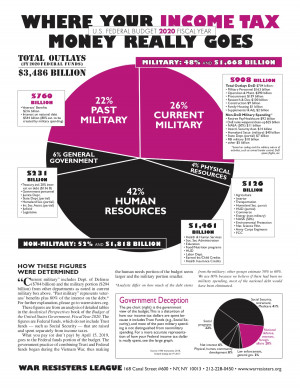How you can resist funding the government →
a survey of tactics of historical tax resistance campaigns →
reach out to potential resisters at the time and place of payment →
Tax Day actions →
2019
Some links that have slid past my browser window in recent days:
- The War Resisters League’s pie chart flyer:
“Where Your Income Tax Money Really Goes”
has been updated for the proposed 2020 federal budget. The flyers, which
show about half of the federal non-trust-fund budget going to pay for past
and present military-related expenses, are good conversation-starters,
especially during tax season as people in the United States tally up how
much they’ve been contributing to this budget over the year.
- NWTRCC
is keeping a running tally of
“Tax Day” actions taking
place in the
U.S.
- Spanish war tax resisters are also in the middle of their tax season
activities. They recently staged a demonstration at the port where a military aircraft carrier was docked.
Here’s some video of the demo as well.
- The head of the police in Paris was dismissed and the government brought in
the army, while banning protests in French cities, as it attempts to quell
the frequent outbreaks of gilets jaunes protests.
Meanwhile, the
destruction of
traffic cameras
continues in France, and to a lesser extent elsewhere.
Some tabs that have passed through my browser in recent days:
War Tax Resistance
- CBC News profiles Canadian war tax resisters Charlotte & Ernie Weins.
- War tax resisters in the United States celebrated “Tax Day” with the usual protests, penny polls, leafletting, and other methods of outreach.
- The Berkeley Daily Planet covered the People’s Life Fund annual granting ceremony in which they redirected $15,000 in taxes from the federal government to local charitable groups.
- The war tax redirection movement in Spain has also been gearing up. Here’s an example page promoting this year’s campaign. Excerpt (translation mine):
The refusal to collaborate economically with the state, in the financing
of military spending and other things that we consider socially unjust
or harmful, empowers us and allows us, collectively and cooperatively,
to show our opposition to certain state policies, to generate a social
debate about the model of society that we want, while at the same time to
promote the construction of “another possible world” by giving economic
support in solidarity with other transformative struggles that exist in
our society and elsewhere.
Other Tax Resistance News
- The “Learnt” comic presents a one-page cartoon primer on tax resistance.
- J.D. Tuccille, at Reason, examines the ongoing collapse of tax morale in the United States: “Americans are increasingly reluctant to pay the IRS. Who can blame them?”
- Mike Causey, at Federal News Network, adds another article to the growing consensus that the IRS is in a world of pain. Causey includes a long quote from an anonymous “long-time career IRS manager” who says:
…There are barely enough people left keeping the lights on to barely
allow enough people to barely meet far reduced goals.… Millions of
dollars of production are lost due to not having hundreds of dollars of
resources on a regular basis.
Most of the personnel with most of the talent and experience have retired
or fled to the private sector…
- The Republican tax reform legislation does seem to have cut taxes for just
about everyone. But only a minority of people think they personally got a tax cut.
This may be in part because of Democratic talking points about the cuts
having only gone to the wealthy — they seem to have hit their target and
sown doubt about what the legislation accomplished. It may also be because
tax refunds haven’t gotten any bigger for the typical taxpayer,
and changes in tax withholding aren’t salient enough to make an impression.
This may also erode tax morale by contributing to the impression that
lawmakers are jiggering the tax code to favor the other guy.
A majority of Americans
believe the federal tax system is not fair, and among Democrats in
particular, perceptions of the fairness of the federal tax system are lower
than they have been in recent memory.
- Automated traffic-ticket-dispensing radar cameras in France have undergone
an extraordinary wave of attacks by frustrated motorists. Statistics on the
extent of the attacks and their effect on government revenue continue to
come in. The latest show that revenue from radar vans in particular dropped 42% last year.
- The IRS is hoping to get a bunch of new funding for a desperately-needed computer modernization effort. Problem is, this isn’t the first time, and the last couple of times they’ve gotten a bunch of new funding for desperately-needed computer modernization efforts, they’ve bungled it badly. Will Congress let them take another swing? Do they have a choice?

